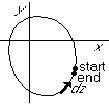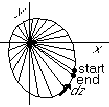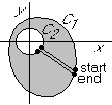We will look a bit at contour integrals of arbitrary complex functions
f. Your first idea should be that a contour integral of a complex
function, ![]() would be zero. After all, assuming the
antiderivative of f exists, call it F, the integral would be the
difference between F at start and end of integration. For a closed
contour, start and end are the same.
would be zero. After all, assuming the
antiderivative of f exists, call it F, the integral would be the
difference between F at start and end of integration. For a closed
contour, start and end are the same.

As an example,

However, the integral is not always zero. F might be multiple-valued: in that case, we might need a different value for F at the end than at the beginning. For example, for any contour that goes once around the origin:
![]()

Note that function f=1/z is singular at z=0. As this example shows, the value of a complex contour integral depends critically on singularities inside the contour:
As a consequence:
In the figure, the integral around contour C1 is the same as around contour C2 as long as there are no singularities inside the grey area:

Exercise:
Integratealong a circle of unit radius around the origin z=0. Hint: contract the circle to a very small circle around the origin and then approximate.
You should now be able to do The exercise above.